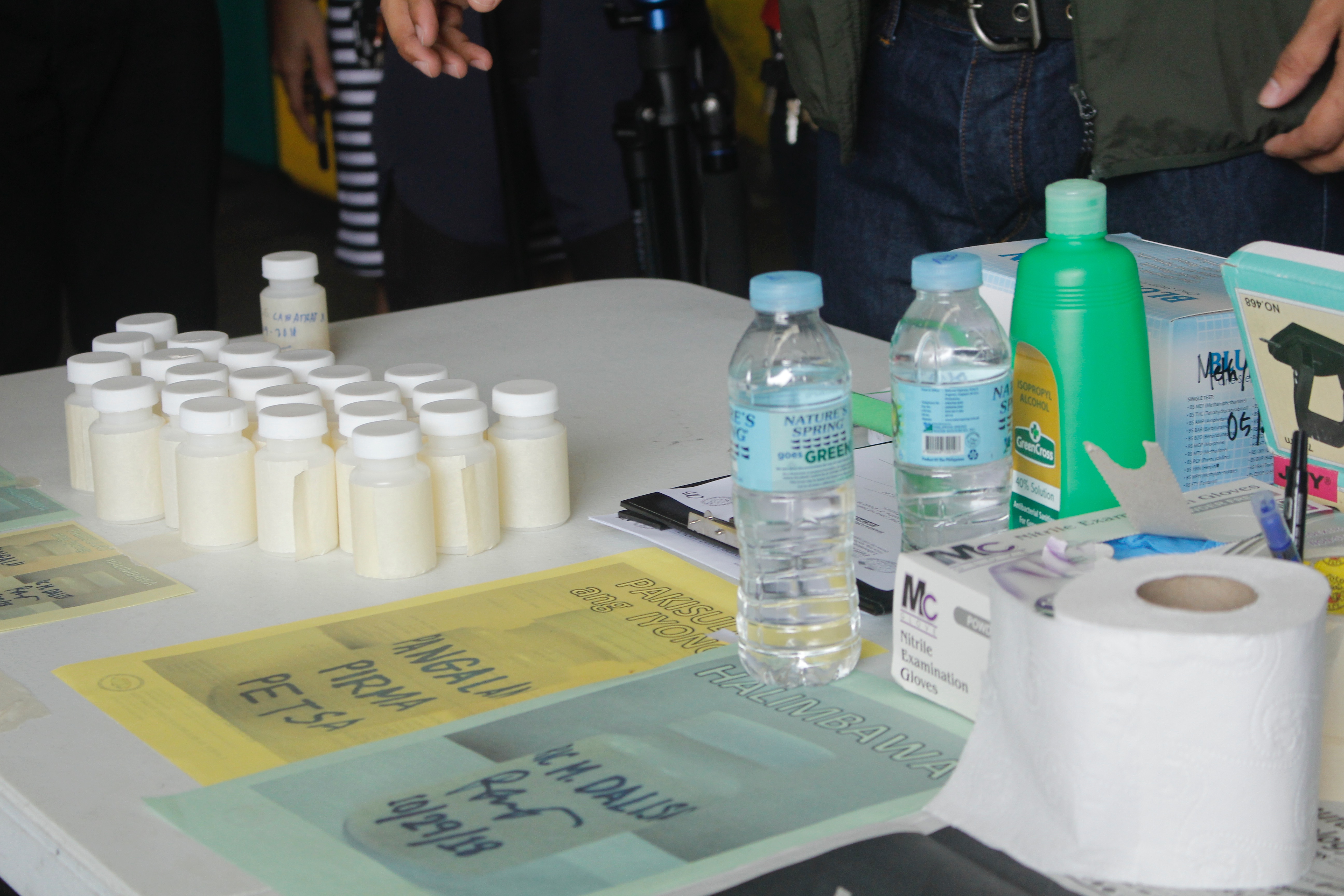
PDEA agents receive urine samples from bus drivers and assistants during a surprise inspection at the Busport Terminal at Araneta Center on Monday. INQUIRER.NET PHOTO /GAB LALU
Anti-narcotics agents found a provincial bus driver positive for drug use when they launched surprise testing on Monday at major bus terminals in Quezon City in preparation for Undas.
Dubbed “Oplan Undaspot,” the unannounced drug testing targets drivers and bus conductors.
Operatives of the Philippine Drug Enforcement Agency (PDEA), Land Transportation Office (LTO), and Land Transportation Franchising Regulatory Board (LTFRB) initially swooped down on the terminals of Victory Liner and Bicol Isarog bus lines along EDSA-Cubao, and the New Busport and the Old Bus Terminal inside the Araneta Center.
According to PDEA Deputy Director General for Operations Ruel Lasala, Oplan Undaspot was aimed at countering bus drivers’ bad habit of taking illegal drugs, particularly shabu, to cope with fatigue due to non-stop long drives.
“Para na rin sa kanila (bus drivers) ’yan. Kasi nga, ang byahe ng mga bus masyadong mahaba, at may over fatigue dyan,” he said in an interview during one of the inspections.
“Para na rin sa kanila (bus drivers) ’yan eh kasi nga, ang byahe ng mga bus, masyadong mahaba, at may over fatigue dyan, kaya kung minsan, pananaw natin kaya gumagamit ng droga ‘yang mga ‘yan para maiwasan ‘yong fatigue,” he said in an interview during one of the inspections.
The PDEA said that 147 drivers and bus conductors had been tested from the four terminals as of posting. As of posting, one driver from the Araneta Bus Terminal was found positive for using an illegal substance.
“So far tagumpay tayo, halos negative ang mga driver, kundoktor, except for one. Pero kailangan pa natin ng confirmatory test para talagang mapatunayang na gumagamit siya ng droga,” Lasala said.
The male driver will undergo a confirmatory test to double-check if he is really using illegal drugs. He is suspended from making trips, in the meantime.
“Hindi pwedeng bumyahe ‘yon. Hindi na papayagan,” LTO Law Enforcement Director Francis Almora said.
READ: Drug testing of bus drivers not limited to Manila – PDEA
“Sa part ng LTO, under Republic Act 10586 (Anti-Drunk and Drugged Driving Act of 2013) may procedure doon, kaya pina-process ng mga tauhan ng LTO,” he added.
The confirmatory test was placed to assure that drivers or conductors indeed consumed illegal drugs, because it is also possible for people under medication to be tested positive.
“Kaya kapag nag-fill up sila ng form, kailangan i-declare nila lahat ng mga gamot na ininom nila, kasi maaring magkaroon ng cross reaction,” PDEA Spokesperson Director Derrick Carreon said.
However, if they are still found to be positive after the confirmatory tests, LTO will press charges against them.
“Ang procedure, ide-demanda muna namin. Ang final conviction, matatanggalan, perpetual revocation of driver’s license,” Almora added.
Aside from drug tests, LTO and LTFRB also checked on the road worthiness of some buses and if they are following their prescribed route.
Failure to fully comply with the LTO’s checklist would result in tickets. Buses would be grounded until they get fixed.
“Dalawa ‘yong bus na hindi inallow na bumyahe dito […] ‘yong isa dito, ‘yong plate (number) na dapat naka-display, naka-tago, ‘yong isa naman po out of line,” he added.
Filipinos usually head back to their provinces every early November to pay their respects to dead relatives. According to LTFRB Chair Martin Delgra, more than 800 buses have been issued special permits to travel, out of 1,072 units which applied, in anticipation of the influx of passengers. /cbb